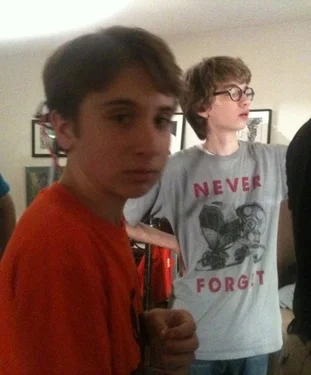riverasennett@gmail.com
Matthew Rivera and Evan Sennett are writers and directors known for co-creating short films that often use 16mm black and white photography, dark humor, jazz scores, and film noir tonalities. They are from Louisville, Kentucky and have been making films together for ten years. Some of their best known titles are Vacancy in the Night (2016), Keep it Clean (2014), and The Executive (2012).
Their work has played in the U.S., England, France, Russia, Brazil, Israel, India, the Dominican Republic, Spain, Canada, Belgium and Serbia. Rivera-Sennett is currently making a new film to be completed this year.
"There is no drag like the U.S. drag. You can't see it, you don't know where it comes from . . . So we pour it in a Pernod bottle and start for New Orleans past iridescent lakes and orange gas flares, and swamps and garbage heaps, alligators crawling around in broken bottles and tin cans, neon arabesques of motels, marooned pimps scream obscenities at passing cars from islands of rubbish . . ."
Burroughs, Naked Lunch
"This is where the camera comes into play, with all its resources for swooping and rising, disrupting and isolating, stretching or compressing a sequence, enlarging or reducing an object. It is through the camera that we first discover the optical unconscious, just as we discover the instinctual unconscious through psychoanalysis."
Benjamin, "The Work of Art in the Age of Technological Reproducibility"
THE last night that she lived,
It was a common night,
Except the dying; this to us
Made nature different.
We noticed smallest things, —
Things overlooked before,
By this great light upon our minds
Italicized, as 't were.
from Dickinson, 1100
Out of the Past
"From the viewpoint of the ordinary eye you see untruth. From the viewpoint of the cinematic eye (aided by special cinematic means, in this case, accelerated shooting) you see the truth. If it's a question of reading someone's thoughts at a distance (and often what matters to use is not to hear a person's words but to read his thoughts), then you have that opportunity right here. It has been revealed by the kino-eye."
Vertov, Three Songs of Lenin and Kino-Eye
"The creative writer does the same as the child at play. He creates a world of phantasy which he takes very seriously—that is, which he invests with large amounts of emotion—while separating it sharply from reality. [...] The unreality of the writer's imaginative world, however, has very important consequences for the technique of his art; for many things which, if they were real, could give no enjoyment, can do so in the play of phantasy, and many excitements which, in themselves, are actually distressing, can become a source of pleasure for the hearers and spectators at the performance of a writer's work."
Freud, Creative Writers and Day-Dreaming (1908)
I-S-d, Josef Albers
Where Danger Lives (1950)
Nay, but an absurd thing had lately been happening to General Loewenhielm: he would find himself worrying about his immortal soul. Did he have any reason for doing so? He was a moral person, loyal to his king, his wife and his friends, an example to everybody. But there were moments when it seemed to him that the world was not a moral, but a mystic, concern. He looked into the mirror, examined the row of decorations on his breast and sighed to himself: 'Vanity, vanity, all is vanity!'
Isak Dinessen, Babette's Feast
'Why on earth did all this have to happen?' he finally cried out in despair, as he trotted blindly and aimlessly along the street. 'Why did all this have to happen?'
Dostoyevsky, The Double
My Darling Clementine
"George had turned at the sound of her arrival. For a moment he contemplated her, as one who has fallen out of heaven. He saw radiant joy in her face, he saw the flowers beat against her dress in blue waves. The bushes above them closed. He stepped quickly forward and kissed her."
"At that supreme moment he was conscious of nothing but absurdities. her reply was inadequate. She gave such a businesslike lift to her veil. As he approached her he found time to wish that he could recoil. As he touched her, his gold pince-nez became dislodged and was flattened between them.
Such was the embrace."
A Room with a View by E.M. Forster
"He sat down. He drank some of the white wine... He hadn't been a success in the police. He wasn't cut out for any service... What was he cut out for?... He opened a drawer and took out a green folder. In the top righthand corner he wrote: Dossier Gévigne. Then he slipped a few blank sheets of paper into it, and sat staring in front of him with vacant eyes."
Boileau-Narcejac, D'entre les morts
Angels With Dirty Faces (Michael Curtiz, 1938)
"You ungrateful brute!" Floating Weeds (Yasujirō Ozu, 1959)
"I didn't do more than ninety back to Los Angeles. Well, perhaps I hit a hundred for a few seconds now and then. Back on Yucca Avenue I stuck the Olds in the garage and poked at the mailbox. Nothing, as usual. I climbed the long flight of redwood steps and unlocked my door. Everything was the same. The room was stuffy and dull and impersonal as it always was. I opened a couple of windows and mixed a drink in the kitchen. I sat down on the couch and stared at the wall. Wherever I went, whatever I did, this is what I would come back to. A blank wall in a meaningless room in a meaningless house.
I put the drink down on a side table without touching it. Alcohol was no cure for this. Nothing was any cure but the hard inner heart that asked for nothing from anyone."
Raymond Chandler, Playback
"'I have spent many, many years in lobbies, in lounges and bars, on porches, terraces and ornate gardens in hotels all over the world. I have outlived everyone in my family. I shall go on being useless and inquisitive until the day comes when the stretcher carries me off to some nice airy corner room in a hospital. The starches white dragons will minister to me. The bed will be wound up, wound down. Trays will come with that awful loveless hospital food. My pulse and temperature will be taken at frequent intervals and invariably when I am dropping off to sleep. I shall lie there and hear the rustle of the starched skirts, the slurring sound of the rubber shoe soles on the aseptic floor, and see the silent horror of the doctor's smile. After a while they will put the oxygen tent over me and draw the screens around the little white bed and I shall, without even knowing it, do the one thing in the world no man ever has to do twice.'"
Raymond Chandler, Playback
Harlan Hubbard, The Fog
http://www.harlanhubbard.com/
"How many things haven't I seen in my line of work? I've seen a father die in a garret, without a cent or a stitch, abandoned by two daughters whom he'd given forty thousand francs a year! I've seen testaments burned; I've seen mothers stripping their children, husbands stealing from their wives, wives killing their husbands to serve themselves the love that inspired their husbands to be fools or imbeciles, so they can live in peace with a lover. I've seen women giving the child of their first marriage the taste of death, so to care for their other child of an illicit love. I can't tell you all I've seen, for I've seen crimes against which justice is powerless. In the end, all the horrors that the novelists believe to invent are less miserable than the truth. You're going to find out all these nice things for yourself; me, I'm going to live in the country with my wife, Paris horrifies me."
Derville in Le Colonel Chabert by Honoré de Balzac
Photographs by Saul Leiter
Even more of a mental conditioner than the movies, is the actual movie house ... The physical confinement of the dark box-like room indirectly conditions the mind. Even the place where you buy your ticket is called a "box office." The lobbies are usually full of box-type fixtures like the soda-machine, the candy counter, and telephone booths. Time is compressed or stopped inside the movie house, and this in turn provides the viewer with an entropic condition. To spend time in a movie house is to make a "hole" in one's life.
Robert Smithson, Entropy and the New Monuments
The screen would light up, they would feel a thrill of satisfaction. But the colors had faded with age, the picture wobbled on the screen, the women were of another time; they would come out; they would be sad. It was not the film they had dreamt of. It was not the total film each of them had inside himself, the perfect film they could have enjoyed for ever and ever. The film they would have liked to make. Or, more secretly, no doubt, the film they would have liked to live.
From Les Choses by Georges Perec



















